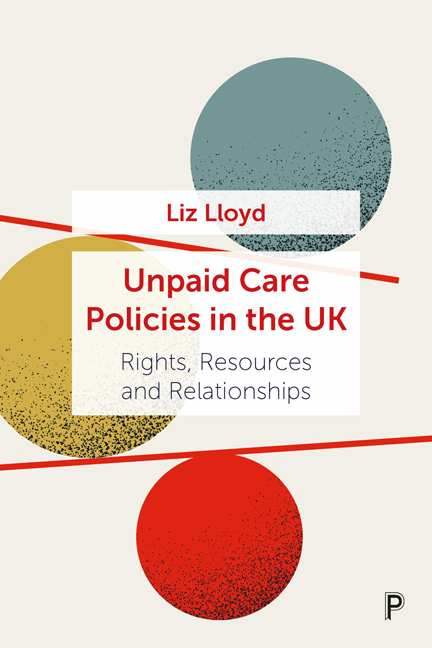Book contents
- Frontmatter
- Contents
- About the author
- Preface
- 1 Introduction and background to unpaid care in the UK
- 2 Research and knowledge development on unpaid care in the UK
- 3 Policies to support unpaid carers
- 4 Policies into practice
- 5 Analysis of policies in context
- 6 The political and ethical dimensions of care
- 7 Conclusions
- References
- Index
7 - Conclusions
Published online by Cambridge University Press: 20 January 2024
- Frontmatter
- Contents
- About the author
- Preface
- 1 Introduction and background to unpaid care in the UK
- 2 Research and knowledge development on unpaid care in the UK
- 3 Policies to support unpaid carers
- 4 Policies into practice
- 5 Analysis of policies in context
- 6 The political and ethical dimensions of care
- 7 Conclusions
- References
- Index
Summary
Introduction
In this concluding chapter, the themes that have arisen from this reflection on the history of research, policies, practices and theoretical debates on policy making and unpaid care are drawn together and the lessons to be learnt for knowledge development, policy making and practice are identified. Points to be discussed include the social status of unpaid care, the actions taken to change this through campaigning and policy action as well as the potential and limitations of policies. The role of the state in relation to unpaid care is central to this discussion. The examination of policies on unpaid care in this book has drawn attention to its marginalised status within the system of social care, reflected in the dominant perception of unpaid carers as background resources. With reference to suggested strategies for the future, the chapter includes an exploration of the potential for an ethic of justice in relationships of care, which upholds the rights of both unpaid carer and the individual who requires care and support.
As argued, many of the contemporary issues facing unpaid carers and those they support have been evident throughout decades of policy making. Over 30 years ago, the Westminster government's Social Services Committee report, discussed in Chapter 1, pointed to the need for properly costed services, including respite and specialist support, which would help carers to remain in paid employment, as well as a comprehensive system of benefits for those who give up paid employment to provide unpaid care. Over the subsequent three decades, these have been an often repeated research finding (see, for example, Banks 1999; Parker et al 2010; Pickard 2012) and are still a high priority in carers’ campaigns today (Carers UK 2021a). As discussed, policies to support unpaid carers have produced important gains. For example, it was campaigning that helped to produce the Carer's Allowance, following the 1999 Carers Strategy in England. Where carers have been represented and where their voice is given due attention, unpaid care now features more strongly in policy circles. In addition, while carers must continue to campaign for more and better services for those in paid employment, the moral case for such support has been won and voluntary action by employers has benefited some carers.
- Type
- Chapter
- Information
- Unpaid Care Policies in the UKRights, Resources and Relationships, pp. 134 - 145Publisher: Bristol University PressPrint publication year: 2023



